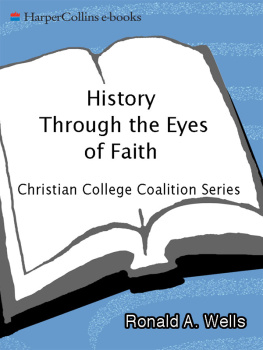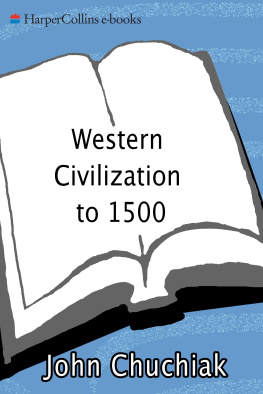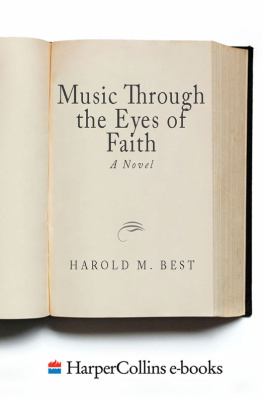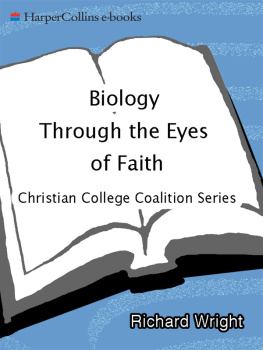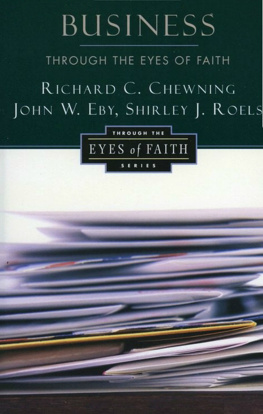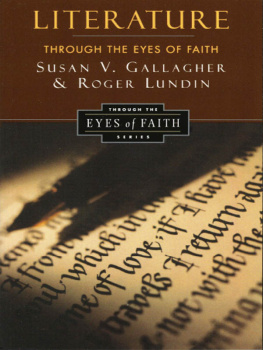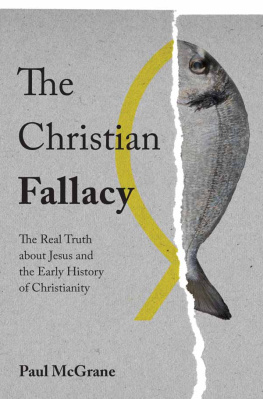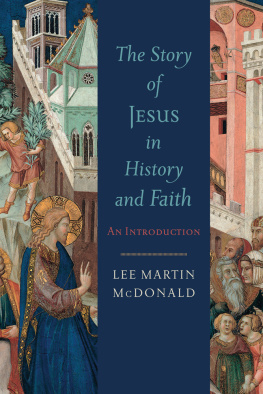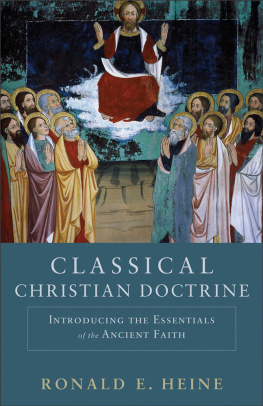CONTENTS
AN INVITATION TO HISTORY: A CHRISTIAN CALLING
GREEKS AND HEBREWS: TYPOLOGIES FOR WESTERN CIVILIZATION
THE HISTORICITY OF JESUS: A PROBLEM OF TEXT AND MYTH
THE EMPIRE AND THE CHURCH: THE PARADOX OF THE TWO KINGDOMS
THE MIDDLE AGES: A PROBLEM IN DEFINITION AND SPIRITUALITY
THE RENAISSANCE: THE REVIVAL OF CLASSICISM
THE REFORMATION: RESTORATION AND/OR FRAGMENTATION
THE REFORMATION AND COUNTER-REFORMATION: SOCIOPOLITICAL ACTIONS AND REACTIONS
THE SCIENTIFIC REVOLUTION: RATIONALISM AND THE MODERN WORLDVIEW
THE ENLIGHTENMENT: A WORLDVIEW IN ACTION
THE AGE OF DEMOCRATIC REVOLUTIONS: THE NORTH ATLANTIC WORLD TURNED UPSIDE DOWN
THE INDUSTRIAL REVOLUTION: THE TEST OF A WORLDVIEW
THE IDEA OF PROGRESS: MODERNITY TRIUMPHANT
THE POST-MODERN MIND: THE SHAKING OF FOUNDATIONS
THE TWENTIETH CENTURY: THE AGE OF ANXIETY
THE AMERICAN COUNTERCHALLENGE: AN ATTEMPT AT MODERNITY REAFFIRMED
COMING TO TERMS: THE CRISIS OF THE WEST AND CHRISTIAN HOPE
GLIMPSES OF CHRISTIAN HOPE

The Christian College Coalition is an association of Chirstian liberal arts colleges and universities across North America. More than 30 Christian denominations, committed to a variety of theological traditions and perspectives, are represented by our member colleges. The views expressed in this volume are primarily those of the author(s) and are not intended to serve as a position statement of the Coalition membership. For more information please contact the Christian College Coalition at 329 Eighth Street NE, Washington, DC 20002.
HISTORY THROUGH THE EYES OF FAITH . Copyright 1989 by Christian College Coalition. All rights reserved under International and Pan-American Copyright Conventions. By payment of the required fees, you have been granted the non-exclusive, non-transferable right to access and read the text of this ebook on-screen. No part of this text may be reproduced, transmitted, down-loaded, decompiled, reverse engineered, or stored in or introduced into any information storage and retrieval system, in any form or by any means, whether electronic or mechanical, now known or hereinafter invented, without the express written permission of HarperCollins ebooks.
Library of Congress Cataloging-in-Publication Data
Wells, Ronald A. 1941
History through the eyes of faith.
1. Civilization, OccidentalHistory.
2. Civilization, ChristianHistory. I. Title.
CB245.W45 1989 909.09821 8845717
ISBN: 978-0-06-069296-4
05 06 07 08 RRD(H) 16 17 18 19 20
EPub Edition MAY 2013 ISBN: 9780062292162
HISTORY TASK FORCE MEMBERS
Russell Bishop
Gordon College
James Cameron
Eastern Nazarene College
James Juhnke
Bethel College, Kansas
Shirley Mullen
Westmont College
Mark Noll
Wheaton College
Timothy Smith
Johns Hopkins University
SERIES ADVISORY BOARD MEMBERS
Nicholas Wolterstorff, Editor in Chief
Calvin College
Free University of Amsterdam
David Benner
Redeemer College
Richard Bube
Stanford University
David Allen Hubbard
Fuller Theological Seminary
Karen Longman
Christian College Coalition
Ann Paton
Geneva College
Timothy Smith
Johns Hopkins University
Richard T. Wright
Gordon College
Biology Through the Eyes of Faith
Business Through the Eyes of Faith
Literature Through the Eyes of Faith
Psychology Through the Eyes of Faith
Sociology Through the Eyes of Faith
W hat does the history of the West look like when seen by a highly competent historian through the eyes of faith? Someone might be inclined to ask in reply, Doesnt it look the same as it does to any other competent historian? Reading this book will show you otherwise. Professor Wells discusses this very issue of the objectivity of history. For as he tells the story of the West, he stops every now and then to reflect on some of the questions that the craft of history as such, and his own telling of the story of the West, might raise in the mind of a reflective Christian.
Most people today would agree that history is not merely a matter of getting the facts right. Always it is a matter of interpreting facts in the face of the data available. Not surprisingly, competent scholars frequently differ in their interpretations. Professor Wellss telling of the story of the West is different from the story that non-Christians would tell. But it is also different from how various competent Christian historians would tell the story. Professor Wells recognizes this, and he takes a stand. But he acknowledges that the positions he takes do not make his telling of the story the Christian interpretation of Western history, only a Christian interpretation. It is one position in the dialogue. And we get an added bonus: Professor Wells not only takes a position in the ongoing debates among historians, both Christian and non-Christian, but often tells us what those debates are all about.
The underlying thesis of the book is that we in the Westlike all humanityhave moved through a succession of crises. A society lives with a certain ideal vision of reality and the good, and it attempts to interpret its experience in the light of that vision and to guide its actions by it. But sometimes the ideal and the real move so far apart that attempts to bring them together are sensed, by society at large, to be failures. The society is then in crisis. Professor Wellss story of Western humanity is the story of the crises through which we have moved.
In this book our present situation is illuminated. But more than that: over and over readers will find themselves challenged to reflect on the light that the Christian gospel throws on history and the light that history throws on the Christian gospel. Christians with settled views on the Middle Ages, say, or on the Reformation, may well find themselves challenged to reconsider those views. And non-Christians with settled views on, say, the glories of the modern world, may well find themselves forced to reconsider those. What is important about the book is its passion for wholeness, for integrity. Professor Wells tries to get beyond the bits and pieces to see Western history whole. He struggles to bring together his Christian faith with the history he knows. In our culture, which, while longing for wholeness, finds almost everything piecemeal, that is remarkable.
Nicholas Wolterstorff
Professor of Philosophy
Calvin College, and the Free University of Amsterdam
T his book is the responsibility of one person but the result of the work of many persons. Throughout my writing I was helped and encouraged by many people. First among those who stood with me are the members of the task force of the Christian College Coalition: Nicholas Wolterstorff, Timothy Smith, Mark Noll, Russell Bishop, Shirley Mullen, James Juhnke, and James Cameron. Their insightful criticisms made this a better book. My colleagues in the Calvin College history departmentespecially Frank Robertswere supportive and helpful, both in encouraging me and in criticizing the manuscript. James Bratt, David Diephouse, and William Van Vugt also gave me special helps at critical times, as did Del Ratzsch of Calvins philosophy department. The provost of Calvin College, Gordon Van Harn, worked with the Christian College Coalitions John Dellenback and Karen Longman to provide logistical support, without which the project could not have been undertaken. I am very grateful to them and especially to Karen Longman, whose grace, patience, and humor were invaluable.

